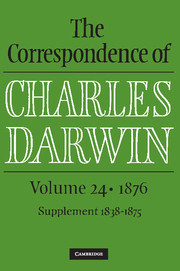Book contents
- Frontmatter
- Dedication
- Epigraph
- Contents
- List of illustrations
- List of letters
- Introduction
- Acknowledgments
- List of provenances
- Note on editorial policy
- Darwin/Wedgwood genealogy
- Abbreviations and symbols
- The Correspondence
- Supplement to the Correspondence, 1838–75
- Appendixes
- I Translations
- II Chronology
- III Presentation lists for Variation 2d ed., Cross and self fertilisation, and Geological observations 2d ed.
- IV Reviews of Cross and self fertilisation
- V Letters regarding the HMS Challenger specimens
- Manuscript alterations and comments
- Biographical register and index to correspondents
- Bibliography
- Notes on manuscript sources
I - Translations
from Appendixes
Published online by Cambridge University Press: 30 December 2016
- Frontmatter
- Dedication
- Epigraph
- Contents
- List of illustrations
- List of letters
- Introduction
- Acknowledgments
- List of provenances
- Note on editorial policy
- Darwin/Wedgwood genealogy
- Abbreviations and symbols
- The Correspondence
- Supplement to the Correspondence, 1838–75
- Appendixes
- I Translations
- II Chronology
- III Presentation lists for Variation 2d ed., Cross and self fertilisation, and Geological observations 2d ed.
- IV Reviews of Cross and self fertilisation
- V Letters regarding the HMS Challenger specimens
- Manuscript alterations and comments
- Biographical register and index to correspondents
- Bibliography
- Notes on manuscript sources
Summary
Translations of letters from the supplement are at the end of this appendix.
From Ernst Haeckel 13 January 1876
Jena
13. Jan 76
Most honoured, dear friend!
Hopefully you have started the new year in excellent health and are working with undiminished vigour on the elucidation of the great biological problems which you have given to science through your reform of the theory of descent and founding of the theory of selection. It is my heartfelt wish that your energy and your interest in the task may continue steadily also in the coming year!
My “Arabische Korallen” you will have received by now. I hope they may delight the great naturalist to whom we owe the explanation of the extraordinary coral reefs, and who for the first time shed light on these marvellous products. I beg you also to note that I named “Monoxenia Darwinii” after you, as one of the simplest and most primitive forms among the corals.
I would appreciate it very much if you, most honoured friend, let me hear your critical views on the “Arabische Korallen”.
Since you have studied coral reefs more closely and know them better than any other naturalist, your judgment in this matter is of special value to me. I would be very pleased if the illustration of the Arabian coral reef on plate III met with your approval.
My essay on the “Gastrula und die Eifurchung” appears to meet with more acclaim among my colleagues than all my other works. Mr Ray-Lankester has provided a summary in English in the latest issue of “Quarterly Journal of Microsc. Science”.
With the best wishes and my most cordial greetings I remain, my dear friend and master, also in the new year | Yours truly devoted | Ernst Haeckel.
From Ernst Haeckel 31 January and 1 February 1876
Jena
31. Jan 76
Most honoured, dear friend!
For both your good and exceedingly kind letters I thank you cordially. It gives me the greatest joy and satisfaction that you, as one of the most painstaking experts and the best judge of coral reefs, are so very content with the “Arabische Korallen”.
- Type
- Chapter
- Information
- The Correspondence of Charles Darwin , pp. 553 - 591Publisher: Cambridge University PressPrint publication year: 2016



